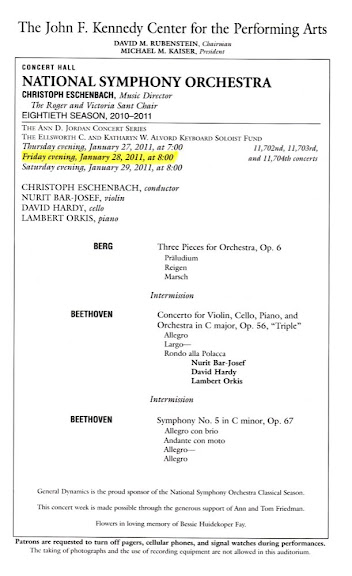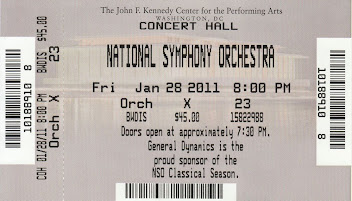
 What a difference a program makes! After the flop with an all-American program, it was so wonderful to hear the all-Viennese one today! The Berg pieces, infused with the sense of foreboding, sounded so fresh as if they were written today. Beethoven's Triplekonzert was something of a disappointment though: in my mind's ear I was hearing the famous Oistrakh/Rostropovich/Richter/Karajan recording with the Berlin Philarmoniker, and even though Lambert Orkis and Christoph Eschenbach were excellent, David Hardy is by no stretch is a Rostropovich; and Nurit Bar-Josef, as nice as her violin sound is, is no Oistrakh.
What a difference a program makes! After the flop with an all-American program, it was so wonderful to hear the all-Viennese one today! The Berg pieces, infused with the sense of foreboding, sounded so fresh as if they were written today. Beethoven's Triplekonzert was something of a disappointment though: in my mind's ear I was hearing the famous Oistrakh/Rostropovich/Richter/Karajan recording with the Berlin Philarmoniker, and even though Lambert Orkis and Christoph Eschenbach were excellent, David Hardy is by no stretch is a Rostropovich; and Nurit Bar-Josef, as nice as her violin sound is, is no Oistrakh. Eschenbach's take on the Beethoven's 5th was very fresh: the dynamic ranges (ppp/fff, crescendo/diminuendo) was wide, the tempi were unusually fast, and even though he is often criticized for an episodic approach and lack of architectural vision, the symphony's progression from one movement to another seemed logical, and it felt like a unified work.
What he needs to work on, it seems to me, is achieving timbre distinction, juxtaposition, and contrast of various orchestral groups, so that the stringed, the woodwinds, and brass would all have their own distinct sound quality, like what one can hear with Amsterdam Concertgebouw under Haitink and Jasons, Leningrad Philharmonic under Mravinsky, or Philadelphia Orchestra that Eschenbach himself used to lead. In fairness though, acoustics of the Kennedy Center Concert Hall are so bad that some of the sound quality may have been simply dampened or distorted. Yet, what Eschenbach has achieved in his short tenure at the NSO is quite impressive.
Midgette, A., Concert review: Christoph Eschenbach showcases National Symphony Orchestra 'family', Washington Post, January 28, 2010.
No comments:
Post a Comment